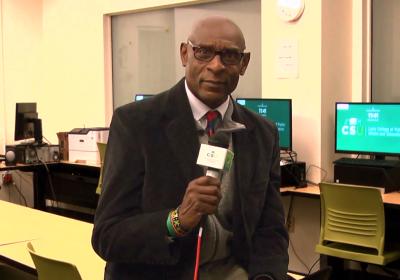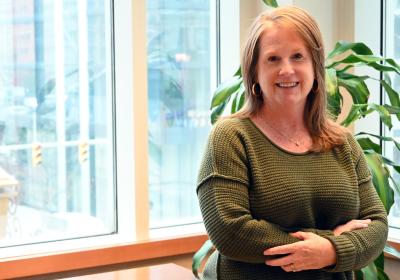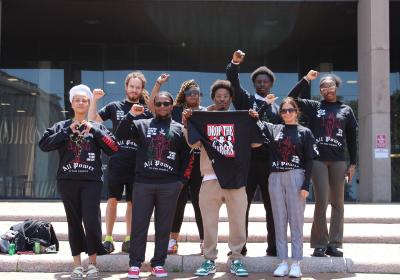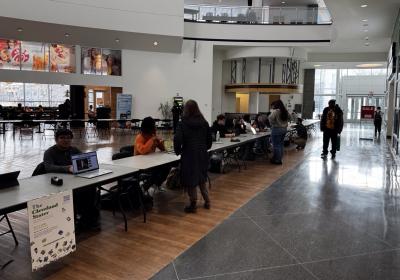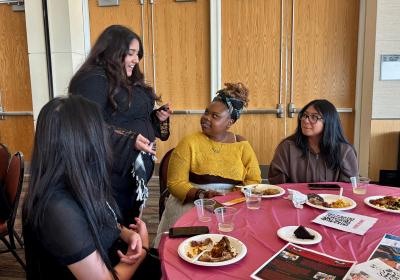
Are Black women living their worst nightmare or just in Cleveland, Ohio?
Cleveland State University's fourth annual Project 400 Our Lived Experience hosted a series of panels Feb. 24 to discuss issues facing Black communities in Cleveland as part of Black History Month. Discussions centered around the theme of, "Our Bodies, Our Minds, Our Communities: Physical, Emotional and Environmental Impacts of Racism."
One of the panel’s topics was the overturning of Roe v. Wade and the impact of the Supreme Court's decision on Black women and families, especially in Cleveland, which has consistently been voted one of the worst cities in the Midwest for Black women to live in. This includes the health services and support, or lack thereof, they receive in the city.
One group trying to make a difference is Birthing Beautiful Communities, a nonprofit organization that consists of a community of birth workers, or doulas, to help provide social support to pregnant women at high risk for infant mortality during the prenatal period.
The organization's Chief Executive Officer, Jazmine Long, was on the panel.
Long spoke on the development of a new ballot initiative to be presented to the state's voters, which, if passed, would better protect women's health rights regarding the choices made for their bodies in the state of Ohio.
“It's still new,” Long said. “Lots of conversations are happening.”
She added that the lack of a policy securing the safety of Black women, and women in general, could result in them hurting themselves whether it be self-harm or making poor healthcare choices due to new legal restrictions, more stress on their bodies, and no support with postpartum depression, or other trauma after giving birth.
The nonprofit’s doulas help Black women to be heard, since, as Long explained, in many cases health care workers ignore the women and dismiss their pain or questions regarding their pregnancy.
“We have to make sure people are listening to our voices,” Long said.
During the pandemic there was a sharp increase in infant mortality and an increase in women’s morality nationwide. However, according to the Center for Community Solutions, Ohio bucked that trend with a decrease in women and infant mortality rate. Nevertheless, the rate of Black infant mortality was more than double that for White infants. The Black infant mortality rate was 13.6 per 1000 live births compared to a rate of 5.1 per 1,000 live births for White infants.
During the pandemic, Birthing Beautiful Communities helped and supported over 1,000 women during their pregnancy.
Another organization on the panel was Preterm, a healthcare provider and advocate for reproductive health, rights, and justice locally and across the country. The chair of Preterm's board is Colette Ngana. She spoke about health care available to Black women, what to know about pregnancy and where to start
“Where do they get the care to support their pregnancy?” Ngana asked during her presentation.
A non-profit, Preterm fights to provide inform women accurate information about services and health care for pregnant women in Ohio and steer them away from websites and organizations that attempt to trick women into believing false information about pregnancy health care.
City of Cleveland Ward 15 Councilwoman, Jenny Spencer, added to the conversation that there is travel funding secured for women who need to go outside the state to get the health care they need for their pregnancy if the six-week heartbeat ban were to be enforced.
“We are prepared to deploy a travel fund if the ban goes back into the effect,” Spencer said. “The cost of an overnight stay…to get somewhere safe.”
The six-week fetal heartbeat bill and other similar bills are an initiative that eliminates the option for abortion after cardiac activity is detected in the fetus. Usually the heartbeat is detected around the six-week period in the pregnancy, however that is not the case for some women.
When the Supreme Court overturned Roe v. Wade last year, Ohio's Republican-controlled legislature swiftly moved to cut off access to nearly all abortions. However, those abortion restrictions are now on hold and the law's fate is in the hands of Ohio judges. Meanwhile, groups pushing for abortion rights in Ohio plan to try to get abortion access onto the ballot, possibly as early as November 2023.
“You want to acknowledge and confront the fact that we don't know what lawmakers may choose to do down the road,” said Councilwoman Spencer, adding that Cleveland should be taking care of its employees and foster values such as safety and confidentiality when it comes to reproductive rights.
To this end, panelists called on the city of Cleveland to take charge and lead in providing support to Black women, not only in the city, but across the country with services that would include open or closed adoption and foster care as options for pregnant women.
As Black History Month ends, March begins the celebration of Women’s History Month.
CSU will be hosting events surrounding women's experiences, support and creative environments throughout the month. To find more information, visit CSU’s announcements.



